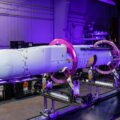OpenAI’s ChatGPT is now back online following what the AI company behind the popular chatbot called a “major outage” that occurred on Tuesday.
Millions of users were reportedly affected when the service went offline early on Tuesday and again after it was initially restored at around noon Eastern Time.
The outage impacted user access to the service in both web browsers and the mobile app. As of Wednesday morning, OpenAI said ChatGPT appeared to be functioning normally again and advised some users to institute a hard refresh on their browsers if they were still receiving notifications that the chatbot was at capacity.
Presently, OpenAI has not issued a statement with details about what caused the outage, which coincided with media coverage of an open letter published by several anonymous former employees of the company who warned of “reckless” behavior it and other AI companies are engaging in by placing profit and a race for dominance in the AI space over concerns about unforeseen outcomes with the technology.
“We are current and former employees at frontier AI companies, and we believe in the potential of AI technology to deliver unprecedented benefits to humanity,” the collective of former employees wrote.
“We also understand the serious risks posed by these technologies,” they said, emphasizing a range of issues that included “the further entrenchment of existing inequalities, to manipulation and misinformation, to the loss of control of autonomous AI systems potentially resulting in human extinction” among their concerns.
“AI companies have strong financial incentives to avoid effective oversight,” the former employees said in the letter, adding that “we do not believe bespoke structures of corporate governance are sufficient to change this.”
The letter’s authors also said that companies like OpenAI’s lack of transparency about the abilities and limitations of the AI systems they are producing presents a variety of potential risks. This, paired with “only weak obligations to share some of this information with governments,” further raises the potential for misuse of the technologies or unintended consequences that may arise from their development.
Presently, there is no indication that Tuesday’s widespread ChatGPT outage had any direct association with the former employees’ letter.
Tuesday’s interruption of service was by far the most significant outage ChatGPT has experienced in 2024. The outage follows a series of controversies OpenAI has endured in recent months, including the temporary ousting of CEO Sam Altman. Altman, a Stanford University dropout who began raising capital for social networking apps, went on to become one of the new leaders in the 21st-century AI boom.
However, former employees of the company, in their letter published earlier this week, warned that companies like OpenAI are effectively playing with fire as they continue to develop machine learning technologies while evading accountability and also stifling objections from former employees using “broad confidentiality agreements” that they say “block us from voicing our concerns, except to the very companies that may be failing to address these issues.”
“Ordinary whistleblower protections are insufficient because they focus on illegal activity, whereas many of the risks we are concerned about are not yet regulated,” the former employees wrote.
“Some of us reasonably fear various forms of retaliation, given the history of such cases across the industry.”
“We are not the first to encounter or speak about these issues,” the letter reads.
In May, OpenAI announced the formation of a Safety and Security Committee, which is led by Bret Taylor, who serves as Chair, along with OpenAI employees Adam D’Angelo, Nicole Seligman, and CEO Sam Altman.
“This committee will be responsible for making recommendations to the full Board on critical safety and security decisions for OpenAI projects and operations,” a news release posted on OpenAI’s website read. The company said that it is currently working to develop and train its next frontier model, which it believes will offer the “next level of capabilities on our path to AGI.”
“While we are proud to build and release models that are industry-leading on both capabilities and safety, we welcome a robust debate at this important moment,” the company said.
Micah Hanks is the Editor-in-Chief and Co-Founder of The Debrief. He can be reached by email at micah@thedebrief.org. Follow his work at micahhanks.com and on X: @MicahHanks.

